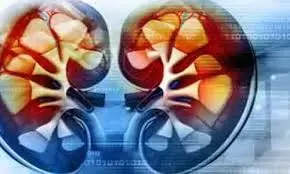- Home
- Medical news & Guidelines
- Anesthesiology
- Cardiology and CTVS
- Critical Care
- Dentistry
- Dermatology
- Diabetes and Endocrinology
- ENT
- Gastroenterology
- Medicine
- Nephrology
- Neurology
- Obstretics-Gynaecology
- Oncology
- Ophthalmology
- Orthopaedics
- Pediatrics-Neonatology
- Psychiatry
- Pulmonology
- Radiology
- Surgery
- Urology
- Laboratory Medicine
- Diet
- Nursing
- Paramedical
- Physiotherapy
- Health news
- Fact Check
- Bone Health Fact Check
- Brain Health Fact Check
- Cancer Related Fact Check
- Child Care Fact Check
- Dental and oral health fact check
- Diabetes and metabolic health fact check
- Diet and Nutrition Fact Check
- Eye and ENT Care Fact Check
- Fitness fact check
- Gut health fact check
- Heart health fact check
- Kidney health fact check
- Medical education fact check
- Men's health fact check
- Respiratory fact check
- Skin and hair care fact check
- Vaccine and Immunization fact check
- Women's health fact check
- AYUSH
- State News
- Andaman and Nicobar Islands
- Andhra Pradesh
- Arunachal Pradesh
- Assam
- Bihar
- Chandigarh
- Chattisgarh
- Dadra and Nagar Haveli
- Daman and Diu
- Delhi
- Goa
- Gujarat
- Haryana
- Himachal Pradesh
- Jammu & Kashmir
- Jharkhand
- Karnataka
- Kerala
- Ladakh
- Lakshadweep
- Madhya Pradesh
- Maharashtra
- Manipur
- Meghalaya
- Mizoram
- Nagaland
- Odisha
- Puducherry
- Punjab
- Rajasthan
- Sikkim
- Tamil Nadu
- Telangana
- Tripura
- Uttar Pradesh
- Uttrakhand
- West Bengal
- Medical Education
- Industry
Longer delay of RRT does no good for critically ill severe AKI patients: Study

France: Longer postponement of renal replacement therapy (RRT) did not confer any additional benefit and is indeed harmful in critically ill patients with severe acute kidney injury (AKI) and no severe complication, finds a recent study in the journal Lancet.
Delaying RRT for some time in critically ill patients with severe AKI and no severe complication is safe and allows optimization of the medical devices use. However, there remains uncertainty on the duration for which RRT can be postponed without risk. Prof Stéphane Gaudry, Département de réanimation médico-chirurgicale, APHP Hôpital Avicenne, Bobigny, France, and colleagues aimed to test the hypothesis that a more-delayed initiation strategy would result in more RRT-free days, compared with a delayed strategy.
For this purpose, the researchers performed an unmasked, multicentre, prospective, open-label, randomised, controlled trial in 39 intensive care units in France. Critically ill patients with severe AKI (defined as Kidney Disease: Improving Global Outcomes stage 3) were monitored until they had oliguria for more than 72 h or a blood urea nitrogen concentration higher than 112 mg/dL.
Patients were randomly assigned in the ratio 1:1 to receive either a strategy (delayed strategy) in which RRT was started just after randomization or to a more-delayed strategy. With the more-delayed strategy, RRT initiation was postponed until mandatory indication (noticeable hyperkalaemia or metabolic acidosis or pulmonary oedema) or until blood urea nitrogen concentration reached 140 mg/dL.
The primary outcome was the number of days alive and free of RRT between randomization and day 28 and was done in the intention-to-treat population.
5336 patients were assessed between May 7, 2018, and Oct 11, 2019, out of which 278 patients underwent randomization; 137 were assigned to the delayed strategy and 141 to the more-delayed strategy.
Key findings of the study include:
- The number of complications potentially related to acute kidney injury or to RRT were similar between groups.
- The median number of RRT-free days was 12 days (IQR 0–25) in the delayed strategy and 10 days (IQR 0–24) in the more-delayed strategy.
- In a multivariable analysis, the hazard ratio for death at 60 days was 1·65 with the more-delayed versus the delayed strategy.
- The number of complications potentially related to acute kidney injury or renal replacement therapy did not differ between groups.
"In severe acute kidney injury patients with oliguria for more than 72 h or blood urea nitrogen concentration higher than 112 mg/dL and no severe complication that would mandate immediate RRT, longer postponing of RRT initiation did not confer an additional benefit and was associated with potential harm," wrote the authors.
Reference:
The study titled, "Comparison of two delayed strategies for renal replacement therapy initiation for severe acute kidney injury (AKIKI 2): a multicentre, open-label, randomised, controlled trial," is published in the journal Lancet.
DOI:https://www.thelancet.com/journals/lancet/article/PIIS0140-6736(21)00350-0/fulltext
Dr Kamal Kant Kohli-MBBS, DTCD- a chest specialist with more than 30 years of practice and a flair for writing clinical articles, Dr Kamal Kant Kohli joined Medical Dialogues as a Chief Editor of Medical News. Besides writing articles, as an editor, he proofreads and verifies all the medical content published on Medical Dialogues including those coming from journals, studies,medical conferences,guidelines etc. Email: drkohli@medicaldialogues.in. Contact no. 011-43720751


